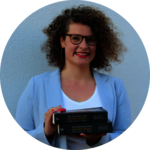Why should I learn German?
Working and studying in Austria as a foreigner

Living in a foreign country means that there is a lot to learn and to adapt to, including cultural habits, daily routines and of course the new language. Nowadays people seem to think that there is no need to learn a new language. You can always use a translation app anyway. Here are six reasons why they are wrong.
Reason 1: Language apps might not always be reliable.
Language apps are seen as the new “deus ex machina”. You type the words, the translation is made for you. Well … this was what I thought as well when I had only studied Croatian for a semester before travelling to Zadar for research work. The situation was as simple as it could be: I wanted to ask the house lady if she could do my laundry (I can do the laundry by myself, but wasn’t allowed to use the washing machine on my own). I typed in the sentence and read it out to her. Her face showed an expression between amusement and perplexity. Only then did I discover the small reflexive pronoun in the sentence. My face turned red. I had just asked her if she could wash me. So my reason number 1: Never fully rely on translation apps, think twice instead.
Reason 2: pronouncing the word “oida” whenever you can.
The small dialect word “oida” is crucial to understanding the Austrian soul. It can be used in any context. If you are close to losing your temper and want to let your social environment know you pronounce the word on the first vowel: “oida!” If you are fascinated by something, you prolongate the “i”: “oIIIIda!” If someone doesn’t get what you mean, you stress the word on the last vowel: “oida!” Trust me: There is no satisfaction like the one you have agreeing with an annoyed person saying “oida!”
Reason 3: work, work, work
The sooner you bring your German skills to a professional level (ideally C-level), the sooner you will have the opportunity to work at the level of your education. Additionally, you will be more confident in the application process.
Reason 4: linguistic images
A language is full of linguistic images that form a special code. Everyone who understands the code is part of the “inner circle”. In everyday language people use a lot of phrases, metaphors and images that could not be understood by someone who doesn’t know the language well. Favorite all-time example: “It’s not the yellow of the egg, but it goes” is the literal translation of the German “Es ist nicht das Gelbe vom Ei, aber es geht”. It means: “It’s not perfect, but sufficient.” “Das Gelbe vom Ei” is the egg yolk and symbolizes the perfect solution because it lies in the core of an egg. Trust me: Conversation is so much fun if you can easily understand this kind of images.
Reason 5: immersing in the world of German Thought
Around 1900 most of the philosophical vocabulary was German. Why? Because of the thinkers behind the ideas: They were all German-speaking. Friedrich Nietzsche, Arthur Schopenhauer, Karl Marx. Studying philosophy and literature you’ll need a bunch of German words, including “Doppelgänger” which is a word for two characters that resemble each other. You can find them in short stories of Romanticism. Apart from that German and Jiddish are very similar. If you deal with the history of the Jewish community all around the world you’ll learn the word “tish” which is the pre-wedding get-together of friends and family of bride and groom (usually women at the bride’s table, men at the groom’s). It’s the same word as the German “Tisch” (= “table”) and this is what happens: bride and groom sit down at a “tish” and their relatives and friends sing, drink and hold speeches. Reason number 4 therefore is: Going back to the roots opens up new worlds.
Reason 6: Get ice cream for free
Ok, I can’t promise that you’ll get ice cream for free. But it can happen. When I was in Rome with my little sister we were invited to an ice cream under one condition: I had to pronounce the word “pistacchio” correctly. In German you’d say something like “pistatschio”, but I knew the correct pronunciation (“pistakkio”). We had our ice cream, the sun shone bright and I fell in love with Rome once more.
This is my top six list of answers to people who find there is no need to study German. And you? Are you ready to improve your German? Then find the course model that fits your needs or interests at Sprachenzentrum.

Eva Mühlbacher
Sprachenzentrum der Universität Wien
